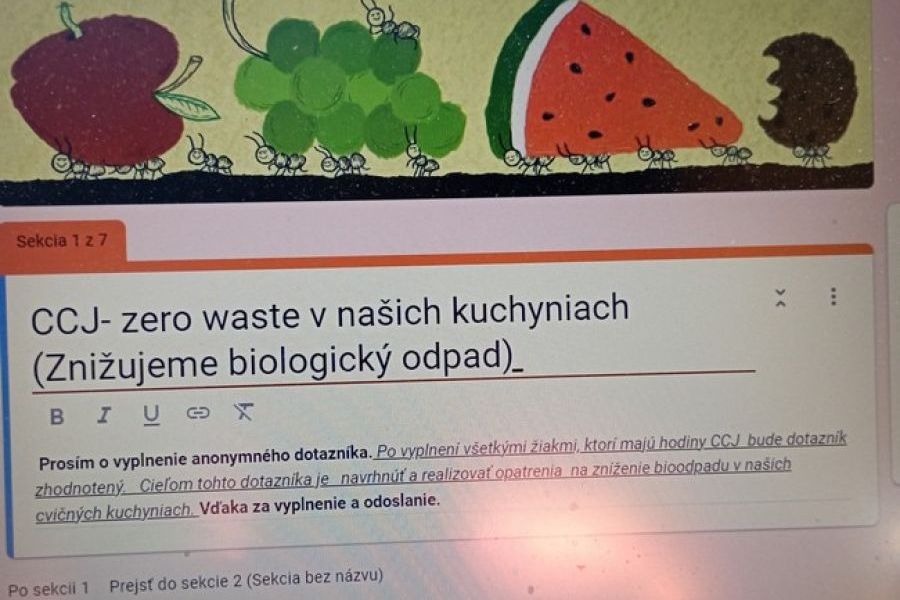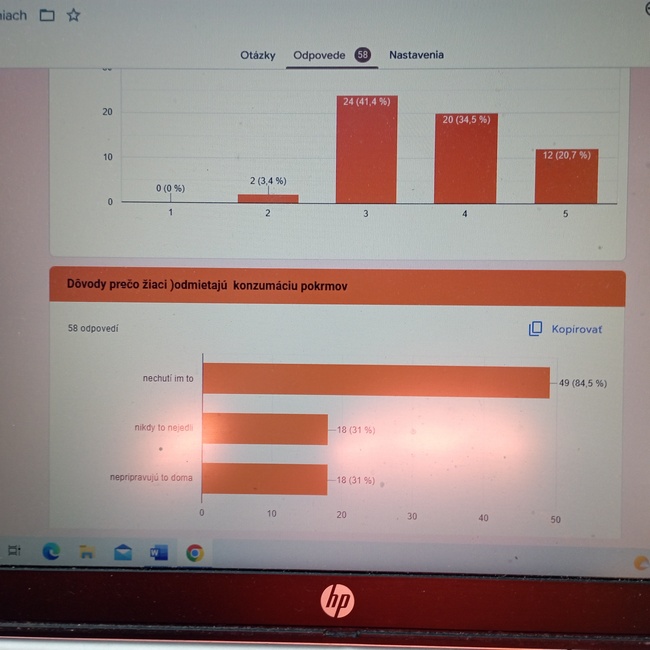
The problem
Within the professional, practical course Exercises in Food Preparation Technology, which is attended by pupils of the first and second year of our school, we prepare dishes according to the curriculum and thus acquire basic cooking skills. Pupils save money as needed to purchase. Some waste is produced in the preparation of meals. We take your invitation to participate in the project as a challenge to do something for us, for our environment, as we have been throwing away and not sorting the waste mentioned so far. By taking the so-called waste from the bin and using it in the preparation of meals, we want to reduce our purchasing costs and, we believe, the amount of waste to a minimum. Over the course of two weeks we weighed the waste for twelve groups of pupils who had to prepare four to five meals once a week as part of a 5 hour block of this subject. The average weight of bio-waste was 0.320 kg per group (11 to 12 pupils) per day.
The solution we used
1. Weighing and analysis of waste.
Based on the weighing of food waste, we have analysed the food waste which constitutes the largest percentage and we have tried to reuse it in the preparation of meals. The largest proportion of the waste was vegetable peelings, fruit peelings and meat trimmings from pre-preparation. Of course the amount of waste also depends on how the shopping is planned, then how the pupils shop. The waste also depends on the types of food prepared by the pupils on the day. Some food waste was used to make edible snacks or used in the school garden.
2. Questionnaires on waste reduction in the practice kitchens.
We sent pupils anonymous online questionnaires called ZERO WASTE in our kitchens.
3. Waste of uneaten food.
In the future, we want to focus on reducing uneaten food waste in the school.
4. Proper food shopping and storage. The next step in not wasting food in the coming school years will be education, educating pupils on food shopping and storage planning. Due to the focus of our school, our pupils will encounter this issue in practice in various catering establishments and some in their professional careers.
Implementation
1. In Nutrition and Health lessons, pupils filled in a questionnaire with the topic Zero Waste in our kitchens. The questions were related to the dishes they prepare in the Food Preparation Technology Exercises. How do they like the dishes, do they eat them, if not, why not. Which dishes do they suggest not to prepare because of the high waste as they do not eat them, which dishes do they suggest to prepare, what suggestions do they have for waste management. Based on the questionnaire, 84 percent of the respondents do not like what they prepare, the most common reason was that they only eat chicken, the second reason in order was that they have never eaten these dishes. Of the suggestions for elimination from the curriculum, vegetable dishes were the most represented, fish was the second most represented Suggestion to compost it was the most represented suggestion for waste generated. Based on the above, next school year we will review the curriculum for both year groups in the practical subject with a view to retaining what is needed in the plans and adjusting them to minimise bio-waste.
2. In the Nutrition and Health lessons we watched a documentary from the Yutube channel in which there was an interview with Vojtech Végh, a Slovakian. He founded the first vegan zero waste restaurant in the world. GastroloveTalks - Zero Waste - Slovak who founded the world's first vegan zero-waste restaurant (youtube.com) Then the pupils discussed with the teacher the topic of food waste and waste in the kitchen.
3. Pupils prepared a bulletin board with the topic of food waste.
4. In the individual lessons of the practical course Exercises in Food Preparation Technology we weighed the waste after the processing of raw materials. After two weeks we calculated the average of food waste.
5. The pupils and the teacher searched the internet for suggestions, recipes for using peelings from vegetables, fruits, meat trimmings- as these made up the largest part of the waste.
6. As part of this project, we informed the school management about our activities and requested the city to provide a composter for our school.
IMPLEMENTED SUGGESTIONS (specifically the use of refuse in food preparation)
- Powdered sugar with lemon zest
We grated the lemon peel, dried it in the oven at low temperature, then blended and mixed it with some powdered sugar. We sealed the lemon icing sugar in a container and will use it in the preparation of desserts.
- Herb oil ( rosemary, parsley, basil)
We chopped the remaining herbs finely, marinated them in the oil, let them marinate for a few days sealed in the refrigerator. Then we drained and poured into a container, sealed. The resulting herb oil can be used in the preparation of meat, pasta and vegetables.
- Broth made from meat trimmings
We used the meat trimmings and vegetable peelings to make stock, which we strained, poured into containers and froze. We will use it in the next exercises when basting meat, in the preparation of rice and in stewing and vegetable dishes instead of broth.
- Vegetable chips
We scrubbed the skins of potatoes and vegetables, cut them, seasoned them and dried them in the oven. We used these vegetable chips to decorate dishes or just to eat during exercise.
- Fertilizer for flowers
We crushed the eggshells into small pieces and offered them as fertilizer for the flowers in the school garden.
Within the framework of the project and the above activities, the pupils developed the competence to learn new recipes, new practices within modern gastronomy. They also developed social and societal competences with regard to the environmental situation and the future of our society. They acquired initiative and entrepreneurship, competences necessary for their future professional career. The pupils expressed their interest in continuing the above activities after the end of the project. We are already looking forward to further activities of pupils and teachers in the field of food and small-scale food policy, changes and consequently pupils' sustainable food habits.


